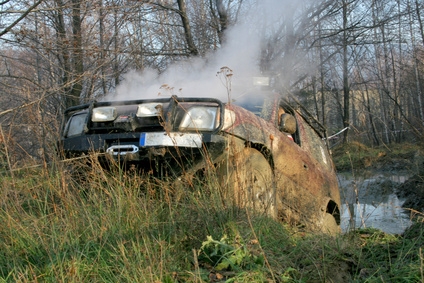
A car's coolant helps to keep the engine from overheating. The coolant is moved from the engine to the radiator, where it is exposed to air through the vents in the radiator. The air cools the coolant down before it enters the hot engine once more. Coolant also moves from the car's engine to the heater core, which provides warm air for the vehicle's occupants during cold weather. A coolant leak if unchecked can cause the car's engine to heat up enough to cause severe engine damage.
The water pump's job is to move the coolant between the engine and the car's radiator. The water pump has several seals that can wear out and become the source of a coolant leak. Some water pumps are made of two main sections that have a gasket between them, which can warp and leak coolant. If there is coolant on the outside of the water pump there is a chance one of the seals in the water pump is the source. Usually a mechanic will replace a water pump if it is the source of the coolant leak.
Radiators are another common source of coolant leaks. Since the radiator sits in the front of the car and is exposed to the outside air, it also is exposed to damage from rocks and road debris. Radiators need to be regularly flushed. If not, the coolant sitting the bottom of the radiator can begin to eat away at the metal and cause a leak. Other common spots for radiator leaks are connections with hoses or at the seams where the radiator's core meets up with the side tanks.
On most vehicles the heating core is located in the heating ventilation and air conditioning system of the car, inside the car's dash. Leaks can be hard to see if they are coming from the heater core, but if a coolant leak is dropping coolant from about the area where the car's dash is it is usually a good indicator the source is the heater core.
Hoses that carry coolant from the engine to the radiator or to the heater core are also common sources of coolant leaks. Since most hoses are made of rubber, they wear out over time from the constant exposure to heat. When the engine is cool you can squeeze the hoses to see if any feel brittle. When heated, if there is a hole in the hose it will often spurt hot coolant into the engine compartment. Hose leaks can also be caused by loose or damaged clamps where the hose connects to other parts of the car.